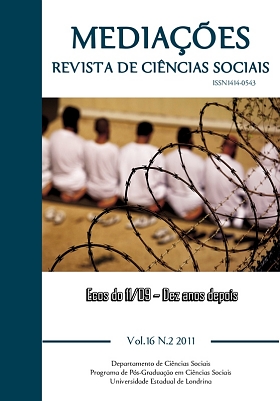Between the state department, Think Tanks and USAID : the american view of ungoverned areas in South America
DOI:
https://doi.org/10.5433/2176-6665.2011v16n2p193Keywords:
Ungoverned areas, Terrorism, United States of America, South America.Abstract
The diffuse nature of transnational threats and lack of effectiveness of some states in dealing with internal problems exponentially increase actions by world powers. This discussion covers the ungoverned areas, which have gained wide importance in discussions on international security, and have particularly impacted the foreign policy exercised by the U.S. in the twenty-first century. From these assumptions it is proposed to discuss, having the South American continent as the stage, the concept of ungoverned areas, their treatment by the U.S. State Department and USAID, summarize the locations at risk appointed by certain centers of strategic thinking (Think Tanks) and compare the locations benefited by USAID and the issue of low regional governance.Downloads
References
CLINTON, Hillary R. Foreign Policy Priorities: the FY2011 International Affairs Budget. Washington, DC, fev. 2010. Disponível em: http://www.state.gov/secretary/rm/2010/02/137256.htm. Acesso em: 18 fev. 2011.
CLUNAN, Anne L.; TRINKUNAS, Harold. Ungoverned spaces? Alternatives to state authority in an era of softened sovereignty. In: INTERNATIONAL STUDIES ASSOCIATION, 48., 2008. Meeting… São Francisco, 2008.
DAREMBLUM, Jaime. Populism, islamism and “indigenismo” vs. democracy in Latin America. 2009. Disponível em: http://www.hudson.org/files/documents/PopulismIndigenismo_Transcript.pdf. Acesso em: 12 fev. 2011.
DESHAZO, Peter; FORMAN, Johanna Mendelson; MCLEAN, Phillip. Countering threats to security and stability in a failing state: lessons from Colombia. Washington: CSIS, 2009. Disponível em: http://csis.org/publication/counteringthreats-security-andstability-failing-state. Acesso em: 8 mar. 2011.
EIRAS, Ana et al. Time to change U.S. strategy for the andeanregion. 2002. Disponível em: http://www.heritage.org/Research/Reports/2002/02/Time-toChange-US-Strategy-for-the-Andean-Region. Acesso em: 15 fev. 2011.
GATES, Robert M. Helping others defend themselves. Foreing Affairs, v. 89, n. 3, may/ june 2010.
GLEASON, Megan et al. Statebuilding in situations of fragility and conflict: relevance for US policies and programs. Washignton: USAID, 2011. Disponível em: http://csis.org/files/publication/110218_Statebuilding_in_Situations_Fragility_Conflict.pdf. Acesso em: 25 jan. 2011.
JOHNSON, Stephen. Latin America’s security puzzle. 2005. Disponível em: http://www.heritage.org/Research/Testimony/Latin-Americas-Security-Puzzle. Acesso em: 15 fev. 2011.
LAMB, Robert D. Ungoverned areas and the threats from safe havens. 2008. Disponível em: http://www.cissm.umd.edu/papers/files/ugash_report_final.pdf. Acesso em: 11 nov. 2010.
MENKHAUS, Ken. Terrorist activities in ungoverned spaces: evidence and observations from the horn of Africa. 2007. Disponível em: http://www.thebrenthurstfoundation.org/Files/terror_talks/Terrorist%20Activities%20in%20Ungoverned%20Spaces.pdf. Acesso em: 9 set. 2010.
MIKO, Francis T. Removing terrorist sanctuaries: the 9/11 commission, recommendations and U.S. policy. 2005. Disponível em: http://www.fas.org/sgp/crs/terror/RL32518.pdf. Acesso em: 24 maio 2011.
NASSER, Reginaldo Mattar. Os Estados falidos: novas ameaças e novas oportunidades. In: NASSER, Reginaldo M. Os conflitos internacionais em múltiplas dimensões. São Paulo: Ed. UNESP, 2009. p. 115-124.
NATIONAL SECURITY STRATEGY - NSS. The national security strategy: of the united states of America. Washington DC: The White House, 2002.
NATIONAL SECURITY STRATEGY - NSS. The national security strategy: of the united states of America. Washington DC: The White House, 2010.
RABASA, Angel et al. Ungoverned territories: understanding and reducing terrorism risks. 2007. Disponível em: http://www.rand.org/pubs/monographs/2007/RAND_MG561.pdf. Acesso em: 9 set 2010.
USAID. Bolivia. Perfil de País. Disponível em: http://bolivia.usaid.gov/perfil.php. Acesso em: 20 maio 2011.
USAID. Brasil. Perfil de País. Disponível em: http://brazil.usaid.gov/pt/node/37. Acesso em: 20 maio 2011.
USAID. Ecuador. Sectores. Disponível em: http://ecuador.usaid.gov/index.phpoption=com_content&view=section&id=7&Itemid=54&lang=es. Acesso em: 20 maio 2011.
USAID. Embassy Sections. Bogotá. Colombia. United States Agency for International Development. Disponível em: http://bogota.usembassy.gov/usaid.html. Acesso em: 20 maio 2011.
USAID. Latin America and caribbean. Disponível em: http://www.usaid.gov/locations/latin_america_caribbean/. Acesso em: 10 maio 2011a.
USAID. Latin America and the Caribbean. Guyana: Overview. Disponível em:
http://www.usaid.gov/locations/latin_america_caribbean/country/guyana/index.html. Acesso em: 20 maio 2011.
USAID. Peru. Strategy: south America regional programs. Disponível em:
http://www.usaid.gov/pe/regionalprograms.htm. Acesso em 20 mai. 2011.
USAID. Policy. Where does USAID’s Money Go? Disponível em: http://www.usaid.gov/policy/budget/money/. Acesso em: 20 maio 2011.
USAID. regions and countries. Disponível em: http://www.usaid.gov/locations/. Acesso em 10 maio. 2011b.
USDS. Country reports on terrorism 2009. Washington, 2010. Disponível em:
http://www.state.gov/documents/organization/141114.pdf. Acesso em: 24 maio 2011.
USDS; USAID. Strategic plan: transformational diplomacy. Washington, 2007.
Disponível em: http://www.usaid.gov/policy/coordination/stratplan_fy07-12.pdf. Acesso em: 24 maio 2011.
WALSER, Ray. Terrorism, insurgency, and drugs still threaten america’s southern flank. 2008. Disponível em: http://www.heritage.org/Research/Reports/2008/06/Terrorism-Insurgency-and-Drugs-Still-Threaten-AmericasSouthern-Flank. Acesso em: 15 fev. 2011.
Downloads
Published
How to Cite
Issue
Section
License
Copyright on articles published in Mediações belongs to the author(s): in the case of partial or entire republication of the original publication, we ask author(s) to indicate the original publication in the periodical.
Mediações uses the Creative Commons Attribution 4.0 International license, which allows Open Access, enabling any user to read, download, copy and disseminate its content so long as adequately referenced.
The opinions expressed by the author(s) are their sole responsibility.
































